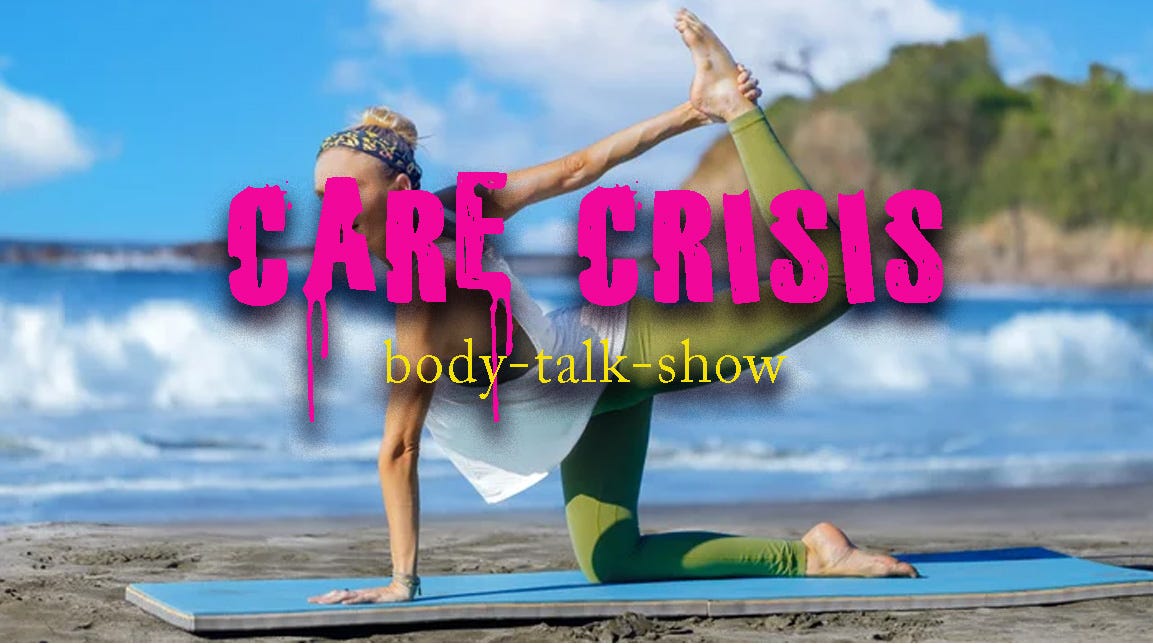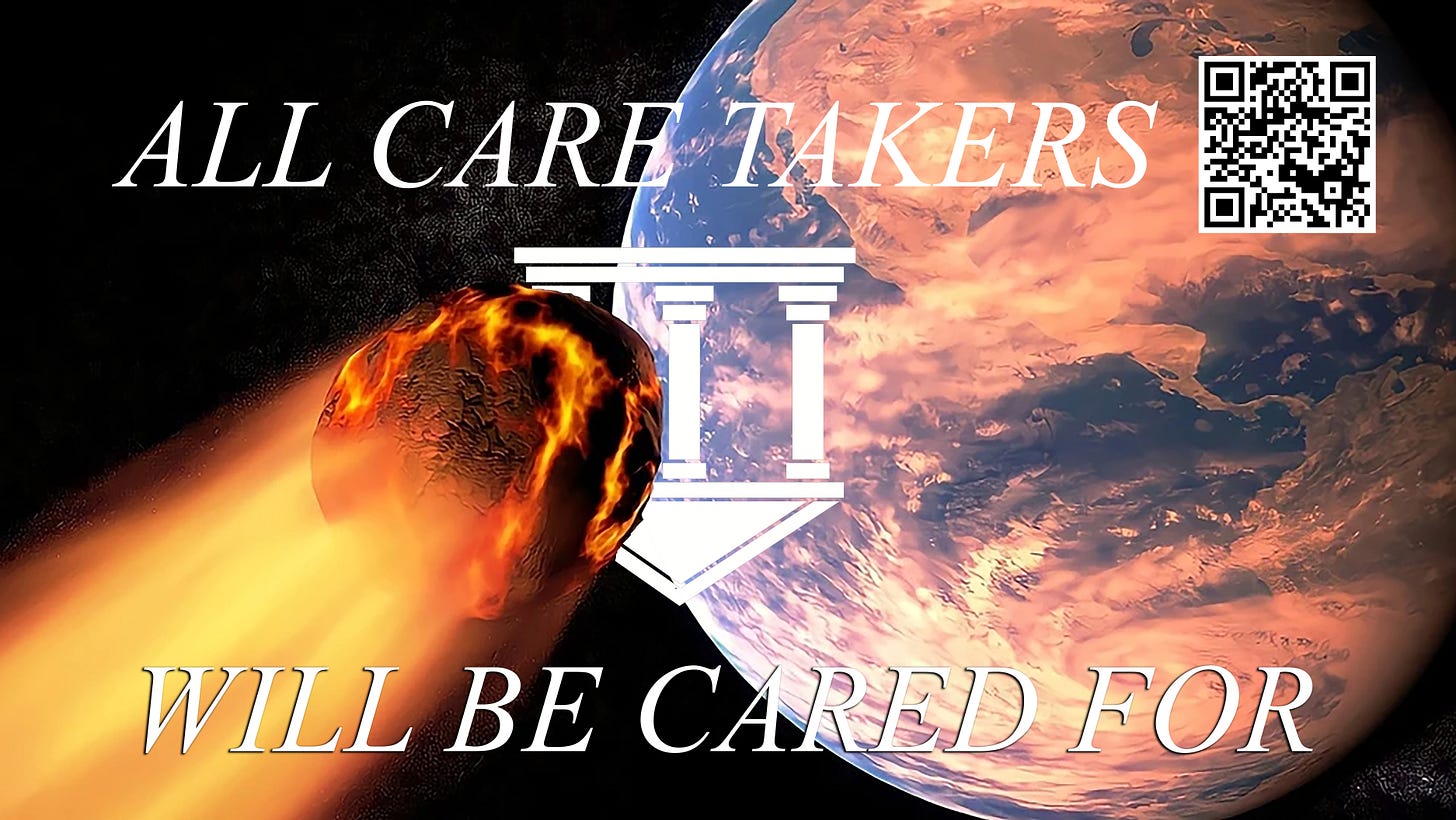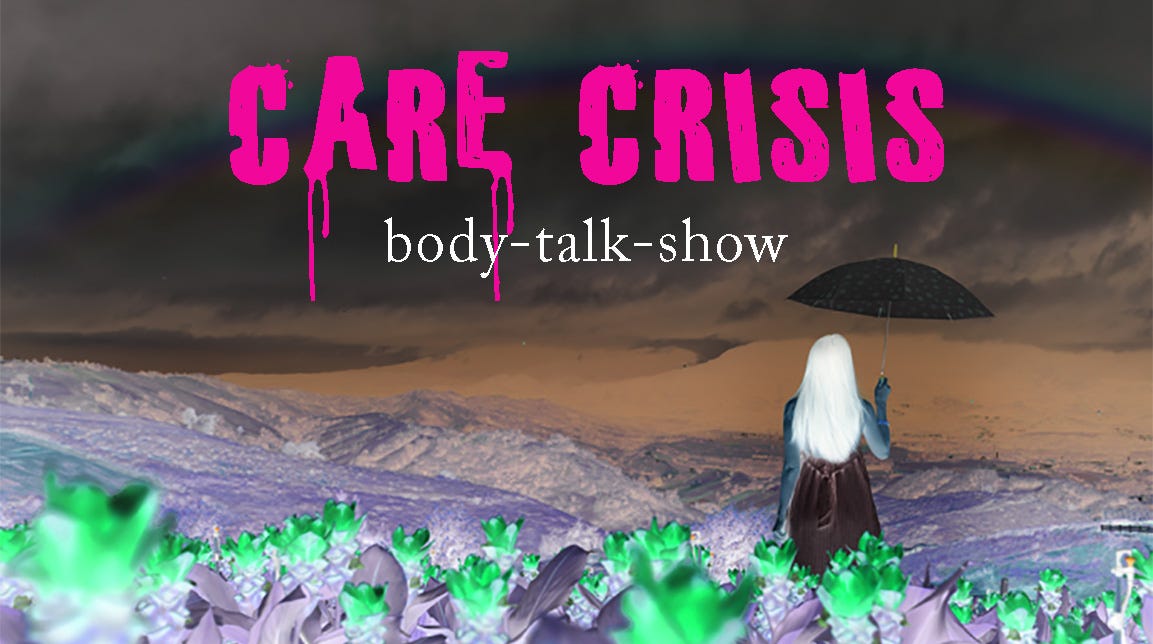The Crisis of Care
as big as the planet and as small as the tiniest question you ever didn't know how to ask
Touch your clavicle and think of all the people you have ever seen.
Touch your chest and think of all the ones you saw who are neglected, forgotten,
and then touch your clavicle think of yourself.
Touch your chest and think of the ways you also feel neglected.
Who forgot about you?
Did you ever feel like the world went by so fast that you just have to hold on with your fingernails to try not to fall off?
And maybe you can't help anybody or you'll get left behind?
Touch your neck and stroke down. Tell me, did you ever feel like you got left behind by somebody who was just holding on by their fingernails?
Did you ever feel like you got left behind by a society that was just holding on by the fingernails?
Touch the part of your nose where it meets your cheeks and tell me, did you ever feel like you needed help but you didn't know who to ask?
Did you ever have a question screaming inside you, but you didn't know what it was, because you didn't know who to ask?
Touch your jaw and tell me, what is your unanswerable question?
What's your untraceable symptom?
What is your indescribable need?
Brush your forehead and imagine that everyone on this street has been abandoned on some level by a system that makes us move towards money like bugs to shit.
Imagine that everyone in the room, and everyone they know, has been abandoned, uncared for, and turned into money.
Work your temples and think of a time of when you tried to access care, when you were too sick to find it, too weak to fight for it. It's ok to feel sorry for yourself. No system was made to work.
Brush all this down your cheeks to your collar bones. Your feelings of neglect are research. The crisis of care starts with you and me. The crisis of care is as big as the planet and as small as the tiniest question you ever didn't know how to ask.
The Care Crisis was a body-talk-show performed at Casino this spring. Each session of theory mixed with Kundalini yoga started with a lymph drainage massage by Magdalena Hartelova, where she read this text. Now there is a video.
The other day, a friend got a serious life changing diagnosis from a health system that acknowledged that it didn't have the capacity to respond properly nor in pace with the health issue they presented. We're talking about the NHS. To get a follow up test will take a very very very long time, they said.
The overwhelm and helplessness that I feel for my friend on the precipice of changing their whole life is familiar to how I feel about my friends in Gaza. By the way, I am still raising money for Ghadir in Gaza. If you can spare a bit, I send her 200 euros per week so she can get food for her family. More on that in a coming message. Please donate here. I really believe that she and her family will cosmically survive the genocide, and in order to keep them healthy so they can do that, we need a lot of money over a long time.
Not knowing where to go for help in an emergency feels like something I have known acutely when doing direct action support work in Thunder Bay, Canada with Wiindo Debwe Mosewin– there were many people living with addiction and long term neglect for whom there was no help from the colonial helper systems. But to feel the impossibility of accessing healthcare, closer and closer to home on a regular basis: this is new. I am trying to build new responses to the feeling that there is not necessarily readily available help for those of us who were taught to rely on it (even if as an idea more than a real experience). The feeling that the healthcare system in Gaza and the NHS are both so broken made me cry crocodile tears. No one is safe from the unknown of our own collective and individual biology. The dismantling of the Center for Disease Control in the US does not portend well for a world of broken healthcare systems. I fear my beautiful dying empire contaminating the world much more freely than ever.
I feel an underlying disappointment, like I paid for something that I'm not getting by living with this reality (specifically the one where my friends have healthcare emergencies and no one is there to fix them). The disappointment is not just for me and my sake, but for everyone who will enter a space of the unknown when they have a health emergency that could be transformed, but that won't be because of the incapacity and lack of resources in our uncared for healthcare systems and social structures for care.
I know I spend a lot of time talking about the Flat White Dimension (FWD), but part of it is because I'm just so surprised and I am surprised to be surprised. I'm constantly surprised to meet people that are just still living as if everything's the same as it was a couple of years ago. And I'm also puzzled by the fact that they're right. For some people, everything is more or less the same. When I taught a workshop recently at University of Copenhagen using The Hologram protocol to discuss what has happened to Danish people experiencing Genocide from afar, and asked about what has changed in people's lives since the Genocide in Gaza began, one friend said: nothing, really. I was puzzled. On the day after the ceasefire brutally ended, after I stayed up all night on the phone with people who were running from fires, I realized what this person meant. I woke up and everything was the same.
Picture of the hair
Unhingedness is the best thing I can offer you right now. My pedagogy: If I can, so can you!? The normal day I woke up to in Berlin after feeling the world end as the Ceasefire ended, led me to walk to a friend's house and invite someone to cut off all my long hair. 20 euros for a casual tonsure to dethrone me from something. “Among the Merovingians, whose rulers were the "long-haired kings",[15] the ancient custom remained that an unsuccessful pretender or a dethroned king would be tonsured. Then he had to retire to a monastery, but sometimes this lasted only until his hair grew back.” I'm ready for the monastery.
Care Crisis: what the heck
What is it? Here are a list of definitions provided in a workshop that I led with Emma Dowling for participants in School of Commons in 2024. Originally I got the words from Emma Dowling, her book about the care crisis shows the financialization of care and how that grows into a systemic lack of care that reaches into people's everyday lives. What I realized recently is that the crisis of care is perhaps a lens that we could look at everything through. Why not? Choose the lens through which you view the burning stuff.
The choice of what lens to peer through reminds me of the time at the end of Occupy Wall Street when Strike Debt was formed. I wasn't there at the first meetings, but what I heard afterwards was that there was a collective decision to use debt as a lens to look at capitalism through for a campaign that would start then (and not end). We could have chosen many things. We could have just chosen housing or healthcare, the financialization of schools, policing or prisons, food production or the IMF, but they and we chose debt as a lens to look through to understand the problems, ironies and pain produced by capitalism, colonialism, white supremacy and systemic abandonment.
And now I wonder about using the Crisis of Care as a way to look at capitalism, colonialism, and power dynamics in general because the truth is that we have a Care Crisis that is so big, so meta, so macroeconomic, and then so local, so miniature, so micro. It's the kind of thing that you can feel underneath all of your fingernails. What I mean is that the Care Crisis is something that exists in our everyday life. And when I say we, I actually mean every person who walks around feeling abandoned or having a pain or a question and not knowing who it's okay to ask it to. Hey, you.
What if all carers were cared for?
I realized in 2022 that I have a proposal to share about the Care Crisis. If we focused on making sure that all carers were cared for, we would have to produce a completely new world. I made a joke a couple of years ago as a part of an exhibition at Mehringplatz20 in Berlin, that this pursuit would be an explosive destroying force for the global economy like the big bang. It was part of a suggestion that we should have something like an international social movement that has the simple demand that all caregivers are cared for, active in every city. That this social movement would be like 17th wave feminism, a kind of demand at the scale of the wages for housework campaign, something that's kind of funny, but also kind of true, kind of absurd, kind of ironic, but that points to something that is impossibly possible, impossibly necessary, and possibly impossible. I made a petition to demand an international study and 78 people signed it (do it!!!). I made a banner, and it got ridiculed and laughed at as cultish at the occupation of the Bundestag when my friends wanted to use it to advertise massages:).
The Issue
For many generations we have lived in a mythical celestial era of the Big Bank, where profit ruled and caregivers around the planet cleaned up the mess. Due to environmental emergencies and social collapse, the mess keeps growing. The world is covered in sick and traumatized people. What can we do? Donate to Ox Fam and go on as normal?
Something will have to change. We want to start now.
This Big Bank era will soon be broken up by something like the Big Bang, except much slower and less violent. The incoming era has been predicted to contain conditions that are completely unfathomable in the current atmosphere. Primarily, all caregivers will be well cared for.
Not even the economy will survive this cosmic shift. To the members of the theoretical physics community: this will be something like the Big Bang except real. We demand a big international study. How do we make a world where all caregivers are well cared for? What would it look like?
But the question for me now, knowing that it may take A LITTLE WHILE LONGER to start the international social movement demanding that all caregivers are cared for as a way to completely reorganize society and the economy, is, how can we start to talk about it? How can we begin to discuss the Care Crisis without abstracting it, when it's so big and so small, when it's almost too much to talk about.
Body Talk Show at ASMR
I was a part of a really cool project at the Casino for Social Medicine called the Anarchist School of Medicine and Repair (ASMR) curated by Magdalena Hartelova and Florence Freitag. We opened our cafe for a couple of days as a medical school with help desks hosted by all kinds of different care practitioners. As we do In the Casino, we brought lots of people together without a hierarchy: there were doctors, there were people that were offering flower essences, there were acupuncturists and shamans, physiotherapists and psychiatrists, just talking to people, 20 minutes here, 45 minutes there.
Every night, I taught a kundalini yoga class at 9pm to wrap the day up. It was called Care Crisis: body-talk-show
Racial capitalism is a care crisis. Berlin is our hospital. Caregivers are pirates. Solidarity is policed. ADHD is climate change. We are nature defending itself. This talk show involves a conversation with your body about the crisis of care, which is as big as our burning planet, and as tiny as the feeling you don't know how to share with anyone.
Each session will include:
-facial lymph drainage (feeling bad for ourselves)
-kundalini class (what is the care crisis on earth)
-meditation (laying on Germany, silent screaming at it to shut up)
Often as I was preparing the sessions where I would talk about the care crisis as we also practice Kundalini Yoga, I would get so overwhelmed by the statistics that I was finding, that sometimes I couldn't teach the class. I couldn't figure out how to say that more healthcare workers were murdered in 2023 than ever in history. And so, one night yoga was replaced by me crying in the corner because I was too overwhelmed by the crisis of care, and the feeling that there is no escape.
The idea of the Care Crisis as a kundalini yoga class is that when we have issues that are so big and then so local at the same time, I don't know how to talk about it without moving, without transforming our nervous systems, without acknowledging the intensity of this information together. We can't possibly take in any more bad news sitting still, without moving it through us. We can't possibly take in any more news alone. This was a tiny answer.
This was a video I made a few years ago for a larger project where I tried to become a yoga teacher who antagonistically taught feminist economics in corporate yoga studios and art spaces to upset and unstuck the rich white self helpers. The videos were also shown at Furtherfield as part of a brilliant exhibition called Playbour and this particular one was played on a huge screen during a summer concert in Finsbury Park!
Sci-fi patterns
Have you seen Popular Unrest? It's a film by Melanie Gilligan. In it, an algorithmic hiccup leads to the formation of “groupings”, where random groups of people meet up in strange outdoor places and don't really know why, but they love each other. At the same time, random stabbings occur in a big corporate bank setting, also from this ai hiccup. I've been watching this film semi annually since it came out, every year feeling more like the fiction is coming true. In the pandemic it felt like The Hologram was one of these groupings where many people both did and did not have a cohesive sense of why they joined us or why they stayed. The knives falling out of the sky seemed to be there too in the form of COVID. At the same time, many other groups began and continue to form. If anyone wants to host me to curate projects based on Popular Unrest, please do! It is my dream.
Some of these groups are getting in touch with us, groups that don't form around money, around work or around even a desire to grow in scale. They're also not necessarily activists (yet), but they are establishing ways of being together in person or online to study themselves, to find collective guidance, to get ready for something that they may not yet have words for (when crisis is not an abstract idea in their lives). This is really new. These are not all white women, nor are they cis gendered middle class people, though they are definitely coming from inside of empires, but not entirely. They are looking to transform and they don't know how. Many are hoping to make their privileges useful in deep ways that take time.
A group that I have recently been getting to know is called Rooted Global Village. I've begun to be-friend and collaborate with Karine Bell, the founder and an organizer in that group. Starting this Sunday (today, May 11!), I'm going to teach a Hologram workshop for this community, and everybody is welcome if you join the rooted network. I'm really proud to be a part of it. Here is an invitation to that community.
In the meantime, I'm planning to come to the US this summer (LA, SF, Olympia, Muncie, and NYC if you invite me). I'm scared and excited. If you want to book me for some kind of event, workshop or other adventure, please get in touch.









